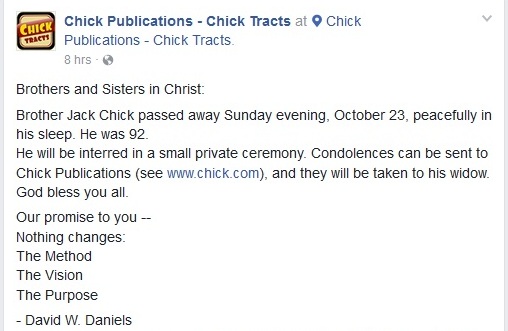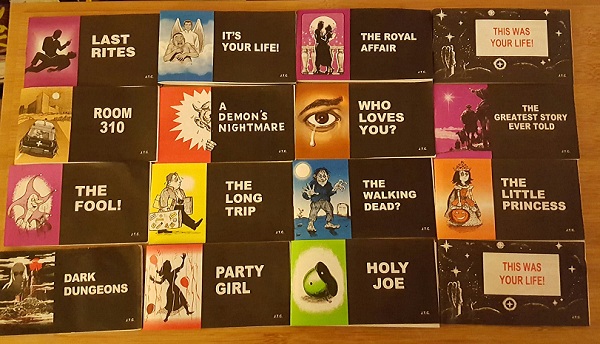Jack Chick has died. His publishing company broke the news on Facebook:

To be honest, I was surprised because I thought Jack Chick had died long ago. I assumed the tract business was being run by descendants or new owners who hired artists to draw under his name. Chick’s reclusiveness probably fed this perception: according to his Wikipedia page, he only did one interview after 1975, and there are few pictures of him, none of them recent.
As many atheists know, Chick tracts push an old-school fire-and-brimstone message in comic-book form. In Chick’s twisted and demoniacal cosmos, basically everything is a scheme cooked up by Satan: Halloween, rock music, evolution, astrology, the TV show “Bewitched”, Dungeons & Dragons (“Not Black Leaf!“), Harry Potter, Al Gore, Roman Catholicism (I remember a Catholic friend from college blurting out “Death Cookie?!” when he learned the title of Chick’s anti-Catholic tract), the Illuminati, the Freemasons, etc., etc. Even innocent involvement with any of them is a greased slide to eternal damnation. It’d be the height of camp if he weren’t so fanatically serious.
Reading a Chick tract is like a frozen-in-amber glimpse into the mind of a white evangelical from the 1950s. It’s all John Bircher-style paranoia, with a world in thrall to evil and Satanic conspiracies lurking around every corner. The Catholic church in particular figured heavily into Chick’s mythology; he called it the Whore of Babylon and went so far as to claim Islam was concocted by the Vatican. I can only imagine how he must’ve felt about modern evangelicals making common cause with Catholics to fight gay rights and choice. There’s also blatant racism, like the fact that the tract “especially for Native American readers” has almost no words.

But for all their hateful worldview and blinding condescension, Chick tracts are a cowardly form of evangelism. You’d think that anyone who could espouse such an extreme brand of fundamentalism would, at least, be well-supplied with conviction. Yet they’re clearly meant for Christians who aren’t so confident in their beliefs.
I say this because Chick tracts don’t require the giver to talk to anyone face-to-face (In fact, that’s why Chick created them). A big part of their appeal is that you can anonymously drop them somewhere, like on a bench at a bus stop or a booth at a McDonald’s, and scurry off convinced you’ve done your duty as a Christian. They’re meant to encourage the fuzzy glow of hope that some person you’ll never meet will find one of them, pick it up and read it, and pledge their life to Jesus on the spot. The website even suggests which tracts to leave where.
Does this ever happen? I doubt it. Religious conversions do occasionally happen, but usually because of cultural ties or close personal relationships with people who espouse those beliefs. As a rule, people don’t reorient their lives around a comic book they find on the street. Or if they did, they’d be the kind of low-commitment individuals who’d drift out of Christianity just as quickly as they drifted in.
But there’s another, more basic way in which Chick tracts are cowardly. It’s that they don’t even try to argue for the truth of Christianity.
Granted, it’s not easy to make a sophisticated apologetic argument in comic-book form. But Chick tracts don’t even try. In their world, no argument is necessary. If you meet an unsaved soul, all you have to do is open the Bible and point to a random passage about Jesus, and they’ll gasp dramatically and fall to their knees. Or, if they don’t convert on the spot, that just proves they’re a truly depraved sinner who deserves the eternity of torture Jesus is going to subject them to.
Chick wasn’t the only Christian who believed that everyone secretly knows Christianity is true and some people just won’t admit it. But he probably did more than anyone to push that dishonest assertion. It’s the know-nothing case for fundamentalism: If you’ve convinced yourself of it, it saves you from having to put forth a rational argument, or even being able to formulate a case for Christianity in your own mind.